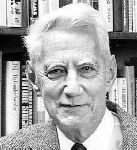George Boole was born in Lincoln, England in 1815 and he died in Cork, Ireland in 1864 at the age of just 49.
In a book he wrote entitled, "
The Laws of Thought", published in 1854, he described how humans deduce and make decisions. He also set this out as a practical mathematics of logic and probabilities. This work provided the rationale and methodology for reducing complex logical relationships to simpler sets of relationships which can reproduce all of the possible relationships from which the set was derived. This process is known as Boolean reduction. Boolean reduction is used to reduce the size and complexity of complex digital logic designs to produce workable logic designs for circuits for digital devices. The success of modern digital circuitry manufacturing, including micro-devices and the computer industry based upon these, rests directly upon the practical utility of the mathematics developed by George Boole.
George Boole's objective in developing this approach to logic was to explain how individuals use information and knowledge to deduce and take decisions. He succeeded in establishing, some 150 years ago, a practical basis for designing expert and knowledge based systems.
| 
Claude Elwood Shannon
1916-2001 |
|
| |

There is no doubt that the person who was instrumental in pointing out the importance of Boole's mathematical logic to digital systems, was Claude Shannon. Claude Shannon was born in Petoskey, Michigan, USA in 1916. He graduated from the University of Michigan in 1936 in mathematics and electrical engineering. In 1940 he gained a masters in electrical engineering and a Ph.D. in mathematics at MIT. Claude Shannon died in 2001 at the age of 85.
Although broadly appreciated for its brilliance, George Boole's work had found limited practical application. However, in 1938 Claude Shannon published a paper, based on his 1937 thesis, entitled, "A Symbolic Analysis of Relay and Switching Circuits" where he explained how Boolean Logic could contribute to a more efficient circuit design. This seminal work launched Boolean logic into the digital world.
It is intriguing how the personal abilities of Shannon were such that, with the combined expertise of electrical engineering and mathematics and having studied Boolean Logic as an undergraduate, he was able to correctly identify the contextual significance of Boolean Logic. In doing so he made a vital contribution to the efficiency of circuit design based on Boolean logic and accelerated the world's entry into the digital era as we know it today.

One of the interesting properties of Boolean Logic is a series of simple "conditional" filters known as logical operators. One of the reasons for failures in economic policy decisions has been the failure to apply logical operators to decisions. Based on our more than 40 years experience in the development of decision analysis and McNeill's extensive development work on inflation, we introduced an array of logical operators into the design of Real Incomes Objective (RIO) economics as a logical array to impose coherene between decisions and policy objectives in order to prevent any ad hoc policy decision from undermining the policy objective of maintaining or raising real incomes. For example, inflation causes a reduction in the value of the currency and real incomes and conventional policies use interest rates to lower inflation whereas this increases financial costs and reduces real incomes so this is self-defeating. Similarly tax is used to lower inflation causing a fall in real incomes. In both cases, inflation control creates austerity and a slow down in growth.
Therefore under RIO interest rates and taxation are not used to tackle inflation. Productivity incentives are used instead and this lowers or eliminates inflation without austerity so that growth rates are higher.

An interesting paper entitled "1+1=1 a tale of genius" was written by Ian Petticrew who was the editor of the INTOSAI Magazine which was hosted on the web site of the National Audit Office (INTOSAI - International Organization of Supreme Audit Institutions) and describes in more detail the linkage between George Boole's and Claude Shannon's work. This paper, from Issue 18, August 2003 of the INTOSAI IT Journal, is available in pdf format and can be accessed on this link:
